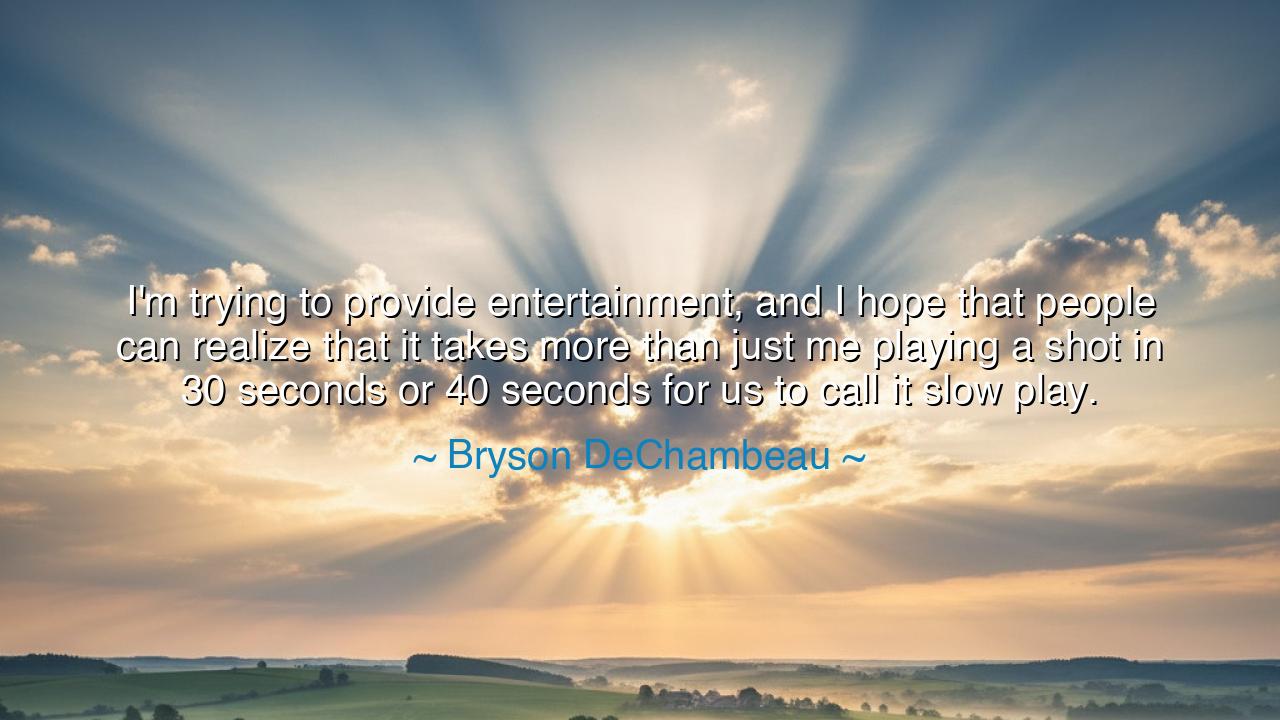
I'm trying to provide entertainment, and I hope that people can
I'm trying to provide entertainment, and I hope that people can realize that it takes more than just me playing a shot in 30 seconds or 40 seconds for us to call it slow play.






“I'm trying to provide entertainment, and I hope that people can realize that it takes more than just me playing a shot in 30 seconds or 40 seconds for us to call it slow play.” — thus spoke Bryson DeChambeau, the philosopher-engineer of the modern fairway, a man both admired and misunderstood, who sought not only to play a game, but to transform it. Beneath his words lies a truth far greater than golf — a truth about artistry, perception, and the weight of judgment. For in every act of creation or performance, the world is quick to measure, to criticize, to time the moment — but seldom does it see the depth of thought that lies beneath the visible act.
In this saying, DeChambeau speaks not as a mere athlete, but as an artisan, defending the sacred process that lies behind the spectacle. When he says, “it takes more than just me playing a shot,” he reminds us that mastery is not a trick of speed or appearance, but a union of mind, body, and intention. The crowd may see a swing; he feels the wind, the geometry, the weight of the moment. The impatient demand for haste blinds many to the invisible layers of craft. In this way, DeChambeau echoes the wisdom of the ancients — that true excellence is never rushed, for it is born of discipline and awareness.
To understand his words, we must remember that Bryson is no ordinary golfer. Known as the “Mad Scientist,” he reimagined the very principles of the game, blending physics with passion, calculation with courage. His clubs, his swing, his approach — all defied convention. And for that, he faced ridicule from those who mistook innovation for arrogance. Yet his persistence revealed a timeless truth: that the pursuit of perfection often appears strange to those who settle for familiarity. When DeChambeau speaks of “entertainment,” he is not only referring to spectacle, but to engagement — the kind of art that invites others to think differently, to feel deeply, to witness something beyond the ordinary rhythm of play.
The ancients, too, knew the burden of being misunderstood. Leonardo da Vinci, whose genius spanned art and science, was often scorned for his endless revisions and meticulous slowness. “Why do you delay?” his patrons asked. But Leonardo knew what Bryson knows — that speed is the enemy of understanding, and that creation must honor both thought and motion. To rush a masterpiece is to rob it of its soul. So when DeChambeau asks the world to look beyond the seconds that tick on the clock, he is really asking for patience — the virtue through which all true art, and all true greatness, is born.
There is another layer to his wisdom. DeChambeau’s quote speaks to the eternal struggle between process and perception. The world judges outcomes — the applause, the score, the headline. But the wise man understands that the unseen labor — the hours of solitude, the mental strain, the devotion to detail — is what gives life to excellence. So too in life: we are all measured by others, timed and compared, as if our worth could be reduced to speed. Yet the soul’s work cannot be hurried. To create meaning, whether in art, sport, or existence, one must sometimes endure misunderstanding. The wise do not rush to please the crowd; they act in accordance with the deeper rhythm of truth.
Even in the ancient games of Greece, the greatest athletes were not those who moved fastest alone, but those who balanced grace with power, patience with precision. The Olympians trained not for show, but for harmony between mind and body. DeChambeau’s defense of his craft belongs to this same tradition — the understanding that performance is not mere motion, but meditation. His “entertainment” is not just excitement, but enlightenment — a glimpse into the art of controlled energy, of measured passion, of thinking made visible.
Therefore, my listener, take this teaching to heart: do not confuse haste with excellence, nor judgment with truth. When the world grows restless and demands that you move faster, remember that the most meaningful work often appears slow. Whether you are building, painting, writing, or striving toward your own dreams, take time to honor the process. Let your actions arise from clarity, not from fear of criticism. As DeChambeau reminds us, what seems slow to others may be the very rhythm of mastery itself. And though the crowd may not understand, the gods — who see beyond time — will know the beauty of your patience, and smile upon your steadfast pursuit of perfection.






AAdministratorAdministrator
Welcome, honored guests. Please leave a comment, we will respond soon